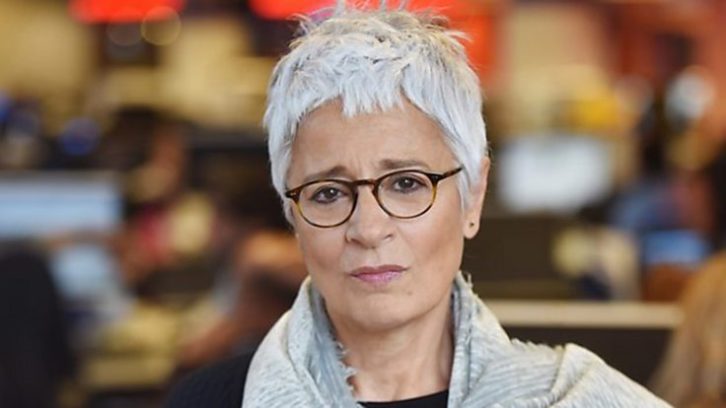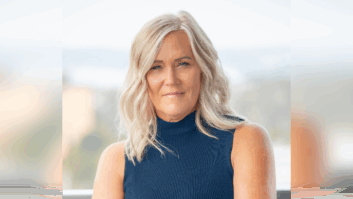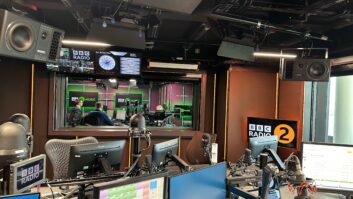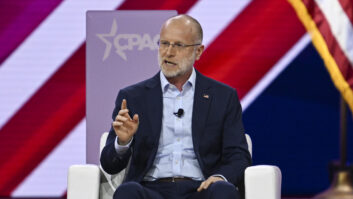BBC plans to streamline its services with a “digital-led” strategy have reached the British broadcaster’s international services.
BBC World Service Director Liliane Landor announced today (Sept. 29) plans to shift seven additional language services to digital-only platforms, move some operations away from London, and consolidate other activities.

The moves are driven, in part, by a need to cut the World Service’s expenses by £28.5 million (about $31.5 million), which is about 10 percent of its annual budget. Just over 380 positions will be eliminated with the changes. The cost-savings were necessitated, in large part, by the British government decision to freeze the license fee that has supported the BBC since 1923. Across its operations, the BCC is looking to save £500 million annually (about $554 million)
Although, the announcement stated that no language services would close, elimination of some TV and radio programs was included, including Arabic, Persian, Kyrgyz, Uzbek, Hindi, Bengali, Chinese, Indonesian, Tamil, and Urdu radio services.
Under the proposal, the Chinese, Gujarati, Igbo, Indonesian, West African Pidgin English, Urdu, and Yoruba language services will move to digital-only, joining the digital-only Azerbaijani, Brazilian Portuguese, Marathi, Punjabi, Russian, Serbian, Sinhala, Thai, Turkish, and Vietnamese language services, as well as the Spanish-language BBC Mundo service.
The ongoing war in Ukraine, as well as intensifying anti-government protests in Iran, demonstrate the need for independent news sources, and the broadcaster stated it is “using appropriate broadcast and distribution platforms” to serve audiences “during moments of jeopardy.”
BBC World Service English will continue to operate as 24-hour broadcast radio service.
[Related: “BBC World Service Turns 90”]
“The role of the BBC has never been more crucial worldwide. The BBC is trusted by hundreds of millions of people for fair and impartial news, especially in countries where this is in short supply,” stated Landor. “We help people in times of crisis. We will continue to bring the best journalism to audiences in English and more than 40 languages, as well as increasing the impact and influence of our journalism by making our stories go further.”
According to the broadcaster, the World Service currently reaches 148 million people worldwide in an average week via digital platforms and the digital share of World Service languages’ reach has more than doubled, from 19 percent to 43 percent since 2018.
“There is a compelling case for expanding our digital services across the World Service in order to better serve and connect with our audiences. The way audiences are accessing news and content is changing and the challenge of reaching and engaging people around the world with quality, trusted journalism is growing,” Landor stated.
The next step, according to the statement, is to consult with staff and trade unions on the proposals.
The proposed changes to the BBC World Service include:
- Focusing on the BBC’s own platforms and presence in markets, and reducing the volume of syndicated TV and radio content on partners’ platforms in some territories.
- Creating a new centralized digital-first Commissioning and Newsgathering Content Production Hub for all non-English language services.
- Moving some production out of London and closer to audiences, including moving the Thai service to Bangkok; the Korean service to Seoul; the Bangla service to Dhaka, Bangladesh; and the “Focus On Africa” TV bulletin to broadcast from Nairobi, Kenya.
- Bringing together long-form content activity, such as investigations and documentaries made by Africa Eye, the Investigations Unit and BBC Arabic documentaries, to ensure a more collaborative approach across our platforms and services.
- Creating a new China Global Unit based in London to tell the global story of China to the world.
- Creating a dynamic Africa content hub that commissions and delivers original, digital-first content for all 12 African language services, as well as coverage of the continent for the rest of the BBC.
- Continuing linear TV broadcasting for both Arabic and Persian languages and investing in building audio and other digital capability in Arabic and Persian to replace radio.
- Closing some radio services, for example Arabic, Bangla, Persian and some TV programming on local broadcasters across Africa and Asia.
- Changing the BBC World Service English content and schedules to allow investment in new initiatives, including new podcasts; a new hour-long science strand from the new science unit in Cardiff, Wales; and more live news and sports programming.







